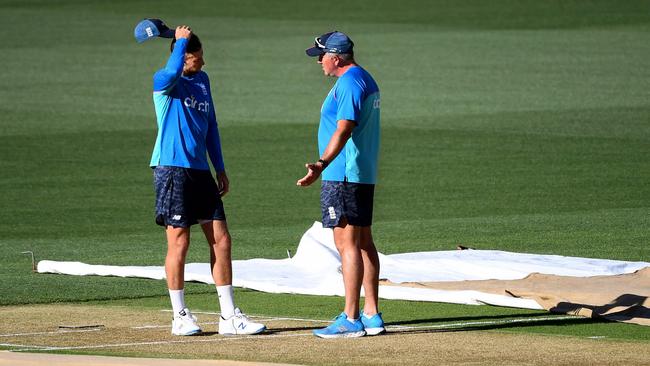
It is, when you think about it, a remarkable concentration of power, one that is increasingly hard to see as justifiable.
Under Silverwood, England have won one of their past 11 Tests, a run that began its downward trend in India, when the Test team was weakened at the altar of T20. It continued through the summer, when the players involved with the Indian Premier League were indulged and allowed to miss the New Zealand series, through to the series with India and the Ashes, which is one match away from being out of reach for another two years.
Throughout that time, it has been hard to discern any improvement in the team’s capacity to play good cricket. The batting has continued to underwhelm, with Joe Root carrying an intolerable burden as the best player in the team. Not even the inherent advantages of the Dukes ball and English conditions helped camouflage the standard of batting or catching in the summer, both of which have continued to be highlighted as glaring weaknesses at the start of the Ashes.

Selection and strategy have been questionable. Ed Smith was still the national selector during the winter months, when rest-and-rotation, with a view to the Australia tour, was implemented, but since Smith was removed from his post in April, that responsibility has fallen on Silverwood’s shoulders, leading to a lack of coherence. Whether you agreed with him or not, Smith explained his choices rationally, intelligently and with conviction.
The misreading of pitch conditions and odd selections have presaged two awful performances in the opening Tests in Brisbane and Adelaide. The old Eric Morecambe line about playing all the right notes in the wrong order springs to mind, given that the team selected for Brisbane was suitable for Adelaide and vice versa. Except Silverwood doubled down after the second Test, insisting that he had not got things wrong. “We put out the best attack for those conditions,” he said.
Silverwood’s press conference the day after the Adelaide Test was remarkable for being so unremarkable. The theme, if there was one, was of learning from their mistakes: “We have to take those lessons into the next game and make sure we learn from them …”; “there are some lessons to be learnt”; “there are things we can learn from a batting perspective”; “they showed us how to play. We have to learn quickly, that was the lesson we took away from it”; “we have had batting collapses before, we have to learn from it and get better”; “we have to learn; we come here and we want to learn from them”. And on, and on.
Well, learning is a lifelong journey for us all, for sure, but at some point supporters would like to hear a different message. Such as lessons that have been learnt and remedies applied.
Coaching, like captaincy, is partly about the message, because players have to feel that the coach (or captain) will have the magic ingredients to turn things around. About captaincy this week, Ian Chappell, a great former Australian captain, wrote: “Players have to believe he [the captain] is some kind of miracle-worker and things tend to work out because of a team’s belief.”
As with political careers, the tenures of all England coaches end in tears, and many of them have seen their fate determined in an Ashes series down under – even if not immediately, like Duncan Fletcher in 2006-07 and Andy Flower in 2013-14. But even in low moments, these fine England coaches exuded an air of authority, command and presence that Silverwood is lacking. “I do believe I can turn it around,” he said on Tuesday. More importantly, do the players?
Of course, only a fool would think a coach can be held entirely responsible for results, in a player-driven game when the captain is in charge for long periods. Only a fool would ignore the present scheduling and Covid challenges and the deeper malaise around English first-class cricket. But none of these broader issues is Silverwood’s domain, even if they have an impact upon it. His job is to help to get the team playing to their potential.
The concentration of power and authority in a single figure was a strategic mistake by Ashley Giles, the ECB’s managing director of men’s cricket. At a time when the amount and broad scope of international cricket demanded a more innovative approach – splitting the coaching roles between formats, for example – Giles moved in the opposite direction, loading responsibility for coaching, selection and strategic planning in the hands of one man.
When he ousted Smith, Giles said that he wanted “clearer lines of accountability”. Unfortunately, when things are going wrong, that’s what he will get.
Room for manoeuvre is evaporating quickly, and the next three Tests loom as critical for Giles, Root and, most of all, Silverwood.
The Times








England have invested a lot of authority in one man. Chris Silverwood has been given more power than any other England coach, taking account of his responsibilities across all three formats and for the selection as well as coaching of those teams.